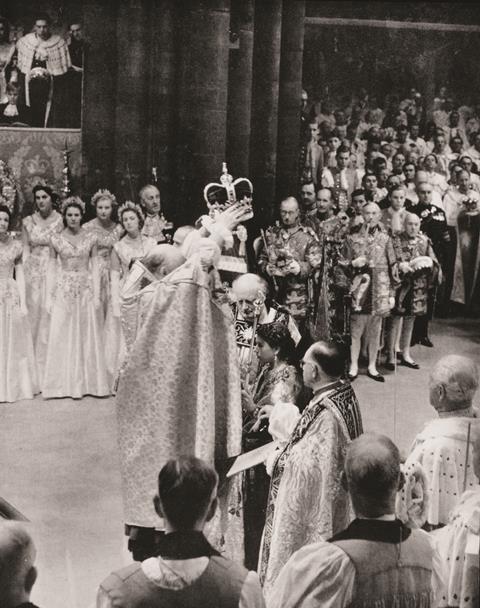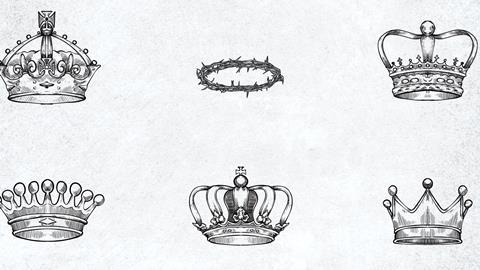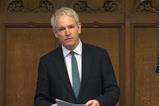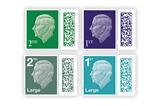With its pomp and pageantry, the coronation might seem arcane and irrelevant, but it is a ceremony intended to bind king, people and Christ together by means of covenantal promises, says David Campanale
When King Charles III enters Westminster Abbey with his consort, Queen Camilla, by his side, trumpets making the proclamation of his coronation will be broadcast across the planet.
In the echoes of history and pageant, a central gospel message will also sound: the confession by Britain’s political order that Christ is Lord. It will mark a renewed submission to the Lamb of God’s heavenly reign, to which all temporal power is limited, contingent and accountable.
Expect great theatre, majestic musical composition, ceremony – led in parts by costumed men with unfathomable heraldic titles – and key roles for political, civic and international leaders. Those attending will not just bear witness, but will play their part in the re-enactment of covenantal promises found in the Bible and repeated through British history for more than 1,000 years.
The Archbishop of Canterbury bears the duty of preparing the coronation’s order of service, and to him alone belongs the right of officiating and of crowning the Sovereign and Queen.
The choir will sing a fifth-century hymn: a confession of faith used at coronations from ancient times, the ‘Te Deum Laudamus’ (‘God, we praise you’). It is a means for the political order to humble itself before Christ, the one raised by God to a throne above any other. The congregation will sing: “We praise thee, O God, we acknowledge thee to be the Lord. All the earth doth worship thee, the Father everlasting. To thee all Angels cry aloud, the Heavens, and all the Powers therein. Heaven and earth are full of the Majesty, of thy glory.”
Kingly authority
But does any of it matter? Is God listening or involved? Does he even expect acknowledgement from politicians and aristocracy increasingly angry or bored that Jesus has a look-in? For many in this pluralist age, the coronation of King Charles is about the bunting and the beer more than bowing before the Almighty. There is, however, a fundamental question at the heart of this ceremony: who has political authority?
The coronation proclaims that power is shared by means of a tri-partite covenant: between Christ and the sovereign, the people and the sovereign, and God and the leaders of the people. In this context, the coronation of King Charles must be understood in the light of what his forebears intended: it carries a divine purpose. The ceremony plays out what they saw as the biblical pattern, with the physical enactment of the promises of Revelation 11:15: “The kingdom of the world has become the kingdom of our Lord and of his Messiah, and he will reign for ever and ever.”
This framing continues to be reflected in our modern parliamentary democracy. We see it in the daily acknowledgement of Christ on the floors of both Houses of Parliament, where to this day, more time is spent in prayer in the Commons chamber than is given over to Prime Minister’s Questions.
Nothing in the coronation need contradict the right assumption that power rests in the hands of the people. Nor should it be forgotten that, just as Israel was warned against taking a king to replace God as their king, the republican tradition in Britain also emerged directly from a radical reading of the Bible.
Whether a covenanted Christian monarchy, or a later Christian Commonwealth (which Cromwell declared came about through “the revolutions of Christ himself”), our political system invites submission to the kingdom of God. The democratic process may take decisions about the secular common good – it is to the electorate that politicians know they give direct account – but the coronation reminds all of us that our constitution acknowledges a higher authority.

What will happen at the coronation?
On Saturday 6 May, the Most Rev Justin Welby, Archbishop of Canterbury, will present the Sovereign to the people, and we will respond with: “God save the King!”
The Sovereign takes an oath, swearing to govern faithfully with justice and mercy. In answer to a question from the archbishop, King Charles gives a solemn promise to God and to all the people to: “Maintain the laws of God and the true profession of the Gospel.” To reinforce that oath, this part of the ceremony ends with the presentation of a Bible: “To keep your Majesty ever mindful of the Law and Gospel of God as the rule for the whole life and government of Christian princes.” The choir sings ‘Veni, creator spiritus’, the ancient hymn invoking the Holy Spirit. The anointing follows, while the choir sings the anthem ‘Zadok the priest’, the words of which (from 1 Kings) have been sung at every coronation since King Edgar’s in AD 973.
The Regalia are then presented, with their reminders that beyond temporal power lies the “Empire of Christ”. On being crowned, trumpet fanfares are sounded, and the congregation acclaim the Sovereign “with loud and repeated shouts” as scripture determines. Charles receives the homage of the people.
Christian witness
As a staged event involving crowns, coronets, minor royals from obscure European houses, titled aristocrats, ambassadors and bishops in silly hats, the coronation can seem arcane and irrelevant. Sceptics may say it makes good TV, pleases the crowds and brings the nation together. For them, that’s enough.
However, for generations, Britain’s political order balanced in tension this pagan impulse with another set of ruling assumptions. Inside what political lawyer AV Dicey called “the dignified parts of the Constitution” – and matched today in parliament by continuing symbols of Christian witness – are enduring reminders not to oppose Christ’s kingdom.
The British constitution and all its limits on unbridled power emerged from the ether of history less than fully formed. But as it developed through the centuries, the admonition that “God opposes the proud but shows favour to the humble” (1 Peter 5:5) came to the fore. The constitution’s Christian aspects were never intended as a mere ceremonial ‘nice to have’. They reflect the protracted struggles of rulers and ruled to establish the mandates of scripture in the institutions of the state – and to fend off competing aspirations to raw power.
THE CORONATION REMINDS ALL OF US THAT OUR CONSTITUTION ACKNOWLEDGES A HIGHER AUTHORITY
Whether parliament or monarchs, moments of British history became peppered with reminders not to get on the wrong side of the Almighty. Like King Nebuchadnezzar, rulers can be forced to scrabble on their knees in the dust. Far better, was the conclusion, to seek God’s mercy and grace.
Before the nations of Britain were united beyond their tribes, the origins of authority seemed plain. It was raw force, imposed by strong men leading military and trading empires, guided by their gods. Then the gospel came from Palestine, across the Mediterranean to the islands of Britain, after which everything changed.
With the Bible came literacy and personal salvation. But also revelations about the steps rulers should follow to please Christ, who, as Isaiah declared, bears the government “on his shoulders” (Isaiah 9:6).
Covenantal codes
Some scholars record that it was his grasp of scripture that compelled King Alfred the Great (871-99) to adopt into law the Ten Commandments and other sections from the book of Exodus. Alfred was persuaded by how Israel the nation was born out of slavery and adversity to become a people of promise. Although the runes lie further back, Alfred adopted this story of covenant to lay the foundations of England.
The ‘covenant code’ is the name given to a text appearing in Exodus 20-23 which contains a recurrent theme: if you do this, then that follows. Alfred wanted his nation to be hedged about by God’s favour, wisdom and protection. So he took steps, as he saw them, to ensure it.
Historian Patrick Wormald describes how Alfred adopted a covenantal relationship for Wessex, after the pattern of Israel. He argues the scholar and king “invited the West Saxons, and perhaps their neighbours too, to see themselves as a new people of God”.
In the St Andrew’s Encyclopedia of Theology (University of St Andrews) professor Luke Bretherton sums up this idea: “Covenants thereby bring into being a moral and political community of mutual obligation, but one that is contingent upon keeping the covenant. Thus, built into a notion of covenant is the sense that it can be broken and must be maintained or renewed if it is to stand.”
The coronation oaths, the anointings, the declarations of the people and warnings of what follows covenant-breaking became central to the formation of political communities in Britain, around what were seen as God’s promises.
A coronation became a sacramental means of renewing and maintaining a civic, tri-partite compact, which was lifted directly from 2 Kings 11:12,17: “Jehoiada brought out the king’s son and put the crown on him; he presented him with a copy of the covenant and proclaimed him king. They anointed him, and the people clapped their hands and shouted, ‘Long live the king!’…Jehoiada then made a covenant between the Lord and the king and people that they would be the Lord’s people. He also made a covenant between the king and the people.”
It seems that Alfred and his Anglo-Saxon successors sought legitimacy and used covenantal means, modelled on the Bible, to maintain it. In doing so, they were backed by Church leaders who sacralised their rule and guaranteed familial succession.
As part of the developing compact between Church and state came an expectation that the Church may give prophetic warning whenever the law of God is broken by rulers.
In 1215 inspired by the biblical story of the prophet Samuel, who warned Israel against taking a king and then wrote down the rules of kingship for Saul, Most Rev Stephen Langton, then-Archbishop of Canterbury, famously secured a peace with the English tyrant, King John. The covenantal document, Magna Carta, saw the people impose written limits to kingly power on the king. It was not for nothing that the leader of the rebellious English barons, Robert Fitzwalter, called himself “Marshal of the Army of God and Holy Church”, in forcing John to seal this settlement at Runnymede.
Renewing the promise
Instead of seeing the elevation of King Charles III to a constitutional fiction of ‘rule’, the coronation, in the light of Britain’s constitutional history, conveys a very different message; power is bound by limits, because the Bible teaches it is both dispersed and shared. But it is also dynamic and spiritual. It says that God isn’t inside the theatre of human history as a mere spectator; he is active on the stage itself, engaging and responding to human volition.
According to the biblical pattern, this moment of covenant renewal with God requires not just consent but engagement from the people. They too assent to the terms of God’s providential role. As 2 Kings 23:3 sets out: “The king stood by the pillar and renewed the covenant in the presence of the Lord – to follow the Lord and keep his commands, statutes and decrees with all his heart and all his soul, thus confirming the words of the covenant written in this book. Then all the people pledged themselves to the covenant.”
During the English Civil War, the parliaments of England and Scotland came together to agree Presbyterian forms of Church government and dispose of what they saw as idolatrous forms of worship. They resolved to defeat King Charles I and hold him accountable for stepping outside God’s bounded purpose for Britain.
In 1643, in a pact called the Solemn League and Covenant, the parliaments of Britain swore a covenant by raising their hands and making public oaths. These oaths – acknowledging Christ – were repeated in public ceremonies around Britain.
The theme of the danger of covenant-breaking for Britain as a nation was repeated in tracts, sermons and military action by the parliamentary army. One of the great divines of that era, Edmond Calamy, explained the devastation of the Civil War in a sermon before parliamentarians in the City of London just two years later: “And when the nation shall say, ‘Wherefore hath the Lord done thus unto the land? What meaneth the heat of this great anger?’ Then shall men say: ‘Because they have forsaken the covenant of the Lord God of their fathers.’”
Whether a monarchy or the flawed idealism of a Christian commonwealth, the Christian story of how to balance competing political claims draws the political order back to Christ, the mediator of covenant.
King Charles III might do worse than to reflect on the sermon given at Scone in Scotland in 1651 to his namesake and predecessor, King Charles II: “Sir, you are a king, and a king in covenant with the Lord; if you would have the Lord to own you to be His king, and your throne to be His throne, I desire you may have some thoughts of this expression – ‘It is the Lord’s throne.’”



































No comments yet